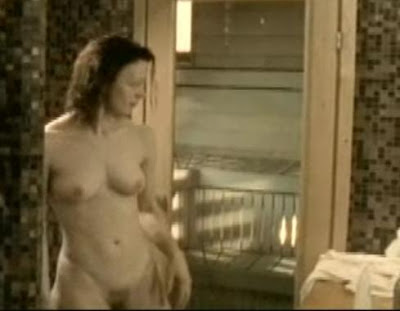October 10, 2002
Varuh Meje (2002) ****
"Varuh Meje" is a Slovenian film directed by Maja Weiss. It tells the story of three young girls on a canoe trip down the river Kolpa, which separates Slovenia from Croatia. It soon becomes a journey of discovery for the girls, while the film turns into a dark allegory about fascism and tolerance. Needless to say, the girls get rid of their bras early on, and the images of them paddling their canoes while completely topless are quite refreshing and arousing. Their breasts, liberated from the constraints of their clothes, are a metaphor, we can guess, of Slovenia liberated from its totalitarian past (or something like that). Anyway, this is probably the best lesbian film ever to come from Eastern Europe.
Frida (2002) ****
Directed by Julie Taymor, ''Frida'' (2002) is a gorgeous film about a fascinating Mexican artist. Artistically, it's a masterpiece, brilliantly mixing art, sexuality, lesbianism and feminism in an explosive and unique fashion. Politically, however, the film avoids any complexities or contradictions. The crimes committed during the Soviet Revolution are never mentioned. The film never deals with Siqueiros's attempted assassination of Trotsky. And we never learn that Kahlo betrayed Trotsky after his death, and became a hard-line Stalinist. But the non-political aspects of the film are handled magnificently. As Catharine Tunnacliffe points out in her film review, Kahlo was a dramatic, often sensual painter whose paintings reflect her preoccupations with fertility, barrenness, androgyny and death. Her life was a riot of dramatic events, beginning with a horrific bus crash in 1925 when she was 18. Salma Hayek (nominated for an Oscar) plays Kahlo fearlessly, pulling off the neat trick of disappearing completely into her character, and being helped along by her extraordinary physical resemblance to the artist. Most remarkable in the film are the superb montage sequences detailing Kahlo and Rivera's visit to America, or "Gringolandia" as she called it in a letter. Using vintage documentary footage, Taymor creates a moving collage that has a flavour of Russian constructivist poster art.
Irréversible (2002) ****
This film became notorious because of the torrid rape of Monica Bellucci, but the truly disturbing thing about "Irréversible" is that this rape scene is probably the least violent and the least explicit scene in the film. The entire beginning of the film (chronologically, it's the conclusion - the whole movie is backwards, like "Memento") is unbelievably violent. Not only are characters totally out of control, crashing each other's skulls, but the camera itself is totally nuts, moving in all possible directions, upside down, sideways and backwards. So when the rape comes and the camera is actually still (for once), it feels strangely peaceful and calm. We feel sorry for Monica (though unlike in "Baise-moi", we are spared the explicit penetration shots), but we are also grateful that the sickening visual rollercoaster ride is over. But then, after the rape, we are treated to several really explicit sex scenes, with Monica and her real-life husband Vincent Cassel. Unlike during the rape, we can then see all of Monica, for a very long time, fucking Vinz in all positions imaginable. What a body! And what courage for such a successful actress to appear in such an explicit scene, with her ass and her bush frequently visible on the screen. The pic was directed by Gaspar Noé, l'enfant terrible of the French cinema, who also directed an unbelievably violent (though less explicit) masterpiece, "Seul contre tous" (the lead actor from that film - what a face! - appears briefly in "Irréversible").
The Salton Sea (2002) ****
Excellent and exciting noir thriller about revenge being a dish that is best served cold.
Subscribe to:
Comments (Atom)










